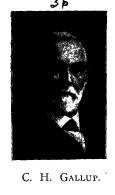Ohio History Journal
|
EDITORIALANA.
VOL. XVIII. No. 2. APRIL, 1909.
NEWLY ELECTED TRUSTEES. It will be noted in the report of the Annual Meeting of the Society, held March 2, 1909, that two life members of the Society were newly elected trustees for the ensuing three years. They were Messrs. Caleb Hathaway Gallup and Walter Charles Metz. Below we give brief sketches of the lives of the gentlemen in question. Mr. Metz has been a member of the Society for some years and has been a student in archaeological lines. Mr. Gallup is known throughout the country for his historical scholarship and for the active and extensive work he has clone in connection with the Firelands Historical Society, of which he has been an influential and official member for a number of years.
CALEB HATHAWAY GALLUP. John (1) Gallup, the ancestor of most of the families of that name, came to America from the Parish of Mosterne, County Dorset, |
|
England in 1630. He became the owner and gave his name to Gallup's Island off Boston Harbor by grant from Governor Winthrop whose wife was a sister of Gallup's wife. A skillful mariner, he be- came memorable as commander of the first naval action off Block Island, fought in North American waters, to avenge the murder of his friend Captain John Oldham, by Indians in the "famous Pequot War" of 1637. His son John (2) participated in the naval engagement off Block Island and in "King Philip's War" as a captain, led a company of soldiers into the "fearful swamp of fight" at Narragansett, December 19, 1675, (within the limits of the present town of South Kingston, R. I.) where he was killed. Shortly before this war, a friendly Indian presented |
|
him with a belt supposed to be a notice or warning of impending war. That belt or sash has descended in the family from generation to genera- tion until now it is in the possession of the Firelands Historical Society for safekeeping in its museum. Benadum was of the third generation; Benadam, his son, of the fourth; William of the fifth generation was living at Kingston, Pennsylvania, with seven children in 1778 at the time of the "Wyoming massacre." His son, Hallet (22 years old) escaped death by floating down the Susquehanna River, patrolled by hostile Indians, his body under water and face between two rails grasped 248 |
